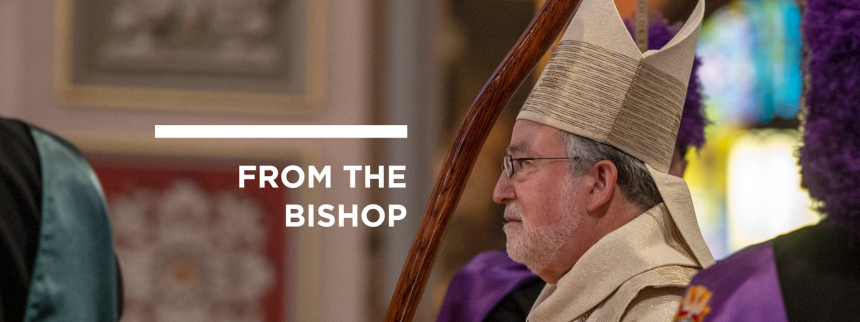
During the recent legislative session in Sacramento, I was reviewing a draft statement against a bill to expand abortion services in the state. In the draft there was a line stating the obvious: “As Catholics we believe in the dignity of life.” This is a true statement. We firmly believe in the dignity of human life from the moment of conception through natural death. This is a God-given dignity, not one conferred by another person, persons, state or religion.
This last point is an important one. Our religious belief does not confer a dignity on the human fetus in the womb. The dignity is inherent to the child’s existence. This is reasonably, factually true and that is why we believe it. Our belief does not make that true. We believe in the dignity of a human fetus because it is true.
Going back to the text in the draft statement, what we believe as Catholics about the dignity of human life from the moment of conception is a reasonable and factual statement. One does not have to be Catholic to come to the same conclusion.
This puts Catholics and Catholic institutions in an increasingly challenging predicament. We struggle to maintain the moral and intellectual integrity of our Catholic institutions, insisting on the religious liberty provided by the U.S. Constitution. At the same time, much of what we hold is reasonable: the dignity of the human person is from the moment of conception until natural death; marriage is the unique expression of creative love between a man and woman; the human person is constituted by both a body and soul. These are not religious truths; these are reasonably and factually true statements about the dignity of the human person. They are self-evident.
While rightly insisting on the religious liberty to practice our faith in the public square, we risk undermining the reasonableness of our argument, enabling others to claim that our Catholic teachings are not reasonable but only personal preferences better left to one’s private life, having no place in reasonable public discourse. The claim is made that our religious and moral beliefs should not be imposed on society. Yet our Catholic convictions are not some kind of sectarian imposition. They are reasonable proposals to contribute to the common good. What we teach in our schools and what we practice in our institutions are good for the human person. They help us and others find true happiness. Catholic teaching possesses common sense intended for the common good of society.
This is an essential Catholic principle: The Gospel of Jesus Christ is intended to save the world. “For God so loved the world that he gave his only Son, so that everyone who believes in him might not perish but might have eternal life.” (Jn 3:16) God chose to have his Son, Jesus, born of Mary so that he could share in the fullness of our humanity, body and soul. This is the wonderful mystery of the Incarnation. More than a message, more than an ideology, more than a feeling, more than a natural phenomenon, Jesus came to save the world in a personal way. Through Jesus, the mercy of God has a human face. The humanity of Jesus is the amazing medium for the message of God’s merciful love.
Through baptism, Jesus uses our humanity to continue his saving mission. Our humanity is capable of communicating God’s saving grace. Our human reason can bring others to God’s wisdom. Our humble, human acts of charity can reveal God’s merciful touch. When we practice our faith in a public way, we are walking in the footsteps of Jesus. Our public lives as disciples of Jesus give others a reason to follow Jesus.
This is what gives the coming Christmas season its particular joy: the Divine Word became flesh and made his dwelling among us and we saw his glory. (Jn 1:14) This year, we will be focusing more on the infancy narrative from the Gospel according to Matthew. Matthew’s account is worth our attention because of the particular challenges we face. The Magi are featured in his Christmas story (Mt 2:1-12).
The Wise Men from the East were led to the home of Joseph, Mary, and the child Jesus by a star. Among the various Christmas tales, the story of the Magi is curious. The Magi were considered to possess great human knowledge and were skilled in the sciences and arts of their time. More than likely, they had little or no knowledge of Hebrew Scriptures. They were not Jews and probably did not share their beliefs. Still, something drew them to the star. Allured by natural signs, they took the path to Jerusalem looking for the new king whose heavenly messenger shone in the sky. Though they were not looking for a promised Messiah, as the Jewish people did, there was a profoundly human restless desire that brought them into the presence of Mary holding the child in her arms. The Gospel narrative continues: “They prostrated themselves and did Him homage. Then they opened their treasures and offered Him gifts of gold, frankincense, and myrrh.” (Mt 2:11)
Jesus spoke to the human hearts of the Magi. Without knowing a word of Scripture, “They were overjoyed at seeing the star.” (Mt 2:10) Culture, knowledge, science and language were not obstacles to knowing the truth and beauty of the Lord Jesus. In the wonderful mystery of the Incarnation, all these expressions of humanity also become expressions of the divine mercy of Christ. Though we may rue the current times as bleak and dark, remember the Magi did their best traveling at night. Our task is to be the starry epiphany of reason, hope and joy that may lead others to faith in the Lord and Savior, Jesus Christ. Merry Christmas.

